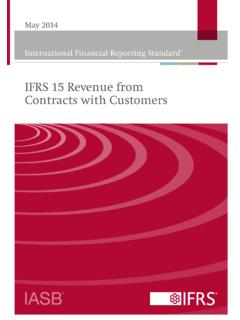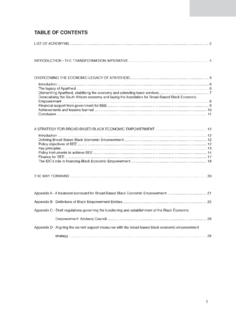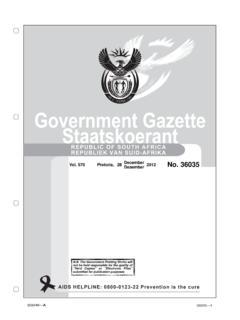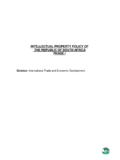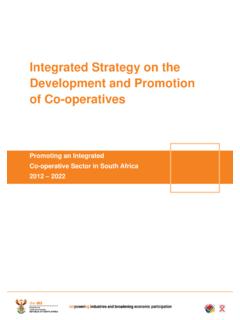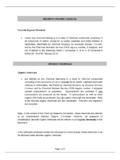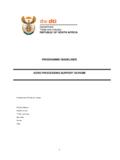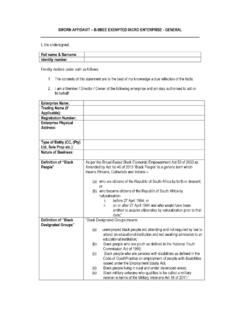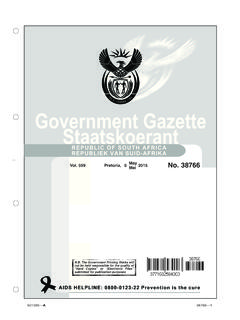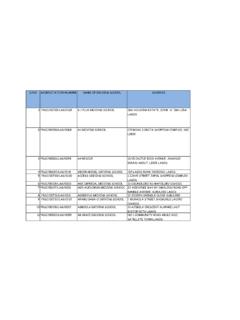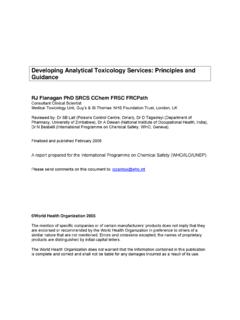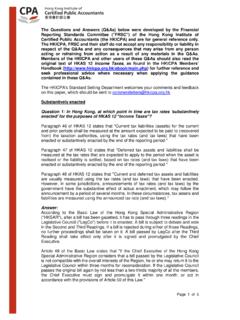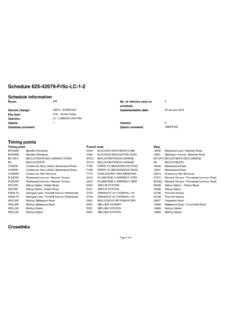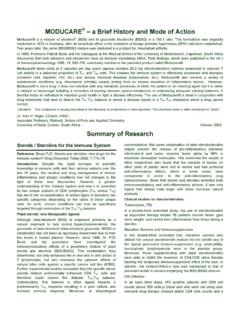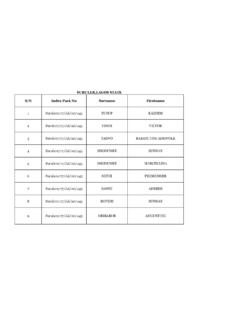Transcription of Rules of Procedure - Department of Trade and …
1 Financial Reporting Standards Council Rules of Procedure FRSC Rule of Procedure Table of Contents Introduction .. 2. A. Due Process .. 4. 1. Introduction .. 4. 2. Development of Financial Reporting Pronouncements .. 4. 3. Consultation .. 4. 4. Responses to Exposure Drafts .. 6. B. Administrative policies and procedures of the FRSC .. 7. 1. Appointments to the FRSC .. 7. 2. Appointment of Proxies .. 7. 3. Meetings .. 7. 4. Observers and Guests .. 9. 5. Stakeholder relationships .. 9. 6. Correspondence with Members of Standards-Setting Boards .. 9. 7. Representing the FRSC .. 10. 8. Representation at other forums .. 10. 9. 10. 10. Conflicts of interest.
2 10. 1. FRSC Rule of Procedure Introduction The Financial Reporting Standards Council (FRSC) was formed in October 2011 and is the legally constituted financial reporting standard-setter for South Africa. Previously, the Accounting Practices Board, a private sector body consisting of a number of accounting and industry bodies, was empowered to issue accounting standards for use by South African companies. The Companies Act 71 of 2008 (Companies Act) imposes an obligation on the Minister of Trade &. Industry (Minister) to establish a body known as the Financial Reporting Standards Council (FRSC). The FRSC has the following responsibilities as identified in section 204 of the Companies Act: to receive and consider any relevant information relating to the reliability of and compliance with financial reporting standards and adapt international reporting standards for distinctive local circumstances.
3 To advise the Minister of Trade and Industry on financial reporting standards matters; and to consult with the Minister on regulations establishing financial reporting standards. Regulation 27 to the Companies Act prescribes specific financial reporting standards to be applied by state owned entities, profit companies and non-profit companies based on factors such as public interest score, whether the entity is listed, and whether the financial statements are internally or independently compiled. These financial reporting standards include: International Financial Reporting Standards (IFRS) as issued by the International Accounting Standards Board (IASB).
4 International Financial Reporting Standards for Small and Medium-sized Entities (IFRS for SMEs) as issued by the International Accounting Standards Board (IASB); or Financial Reporting Standard as determined by the company for so long as no financial reporting standard is specified. In terms of section 204 of the Companies Act, the FRSC held the following view: In view of the obligations imposed on the Minister in terms of section 29(5)(b) of the Companies Act to ensure that all regulations issued by the Minister in the case of financial reporting standards for public companies are required to be in accordance with the international financial reporting standards (IFRS) of the International Accounting Standards Board (IASB) or its successor body, the obligation in section 204(a) can never apply to public companies.
5 The obligation in section 204(a) of the Companies Act imposed on the FRSC to adapt reporting standards for local circumstances is therefore only applicable to entities which are not public companies as defined in the Companies Act;. Any interpretation of section 204(read with section 29(4) and (5) of the Companies Act). to the contrary, will also amount to a direct contravention of IN4 of IFRS 1 First-time Adoption of International Financial Reporting Standards' and IAS 1 Presentation of Financial Statements', which could never have been the intention of the legislature; and Since the power of the Minister in terms of section 29(4) of the Companies Act to make regulations prescribing financial reporting standards is enabling only, there is no obligation on the Minister to do so and by implication, the Minister is not obliged to consider and approve each individual financial reporting standard.
6 The FRSC is therefore not required to endorse or reject IFRS and IFRS for SMEs standards and interpretations as the Companies Act is prescriptive as to the compliance with these standards 2. FRSC Rule of Procedure for specific entities as discussed above. The FRSC does however have the power to issue financial reporting pronouncements (FRPs) which will take into account South African circumstances and issues not specifically addressed by IFRS. The FRSC may also issue FRPs where divergent practice has arisen. These FRPs may notcontradictIFRS or IFRS for SMEs. The FRSC therefore reviews any newly issued International Financial Reporting Standards and Interpretations and assesses the impact thereof in a South African context with a view to determining whether local interpretations in the form of FRPs are required.
7 In addition to this, the FRSC may consider the need for interpretations where there is a need for clarity or where practice has arisen. This document therefore outlines the due process followed by the FRSC in the development of FRPs. The document also outlines the administrative procedures to be followed by the FRSC in the performance of its duties. 3. FRSC Rule of Procedure A. Due Process 1. Introduction The due process requirements of the FRSC are built on the following principles: (a) transparency the FRSC conducts its standard-setting process in a transparent manner;. (b) full and fair consultation considering the perspectives of those affected by the relevant FRPs; and (c) accountability the FRSC analyses the potential effects of its proposals on affected parties and explains the rationale for why it made the decisions it reached in developing or changing a FRP.
8 2. Development of Financial Reporting Pronouncements Financial Reporting Pronouncements (FRPs) and other publications shall be developed through a due process that involves accountants, auditors, preparers, regulators, academics, legal authorities and users of financial statements. Due process is the vehicle through which the FRSC will be able to ensure its continuous relevance and the quality and independence of its recommendations. A topic may be identified as requiring the issue or amendment of a FRP by the FRSC. Following any such identification the FRSC undertakes any necessary research and consultation on the relevant conceptual issues, existing pronouncements and practice in South Africa, and overseas and the economic, legal and practical implications of the introduction of particular pronouncement.
9 The outcome of the research is presented to the FRSC for debate and refinement of the issues. Once a project has formally been added to the FRSC work programme, an FRSC member will be assigned to Chair the sub-committee and the Technical Secretariat will support the Chair in leading the project. Basic research on the project will be conducted by the Technical Secretariat which will include the identification and review of all the issues associated with the topic and consideration of the application of the Conceptual Framework for Financial Reporting, for the issues. They will also study other national accounting requirements and practices and standards issued by other national or international standard setters.
10 Constituent participation is fundamental to the relevance and success of all stages of the FRSCs deliberations. Shortly after a project commences, the Chairperson of the sub-committee will solicit nominations for the sub-committee. The Chairperson of the sub-committee will take responsibility for overseeing the project. 3. Consultation There are some steps that the FRSC must follow before they can issue a FRP. These steps are designed to be the minimum safeguards to protect the integrity of the standard- setting process. 4. FRSC Rule of Procedure The due process steps that are mandatory include: (a) exposing for public comment a draft of any proposed new FRP or proposed amendment to an existing FRP with minimum comment periods.
